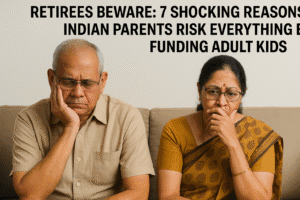Retirees Beware: 7 Shocking Reasons Indian Parents Risk Everything by Funding Adult Kids
Indian retirees are jeopardizing their financial security by prioritizing their children’s needs over their own. Many drain their retirement savings to fund their kids’ ventures—startups, education, or homes—only to face uncertainty later. Emotional guilt and societal pressure often drive these decisions, leaving parents without a safety net. Financial advisor Girish Agrawal warns that this pattern is a “time bomb,” as retirees risk dependency when their funds run dry. The solution? Secure your own future first by ensuring 25–30 years of stable income.
If helping children, formalize support with clear terms—treat it like a loan, not a gift. Open communication about financial limits is key, as kids may not realize the strain. True generosity means safeguarding your retirement, ensuring dignity and independence in later years.

For many Indian parents, retirement isn’t the peaceful, financially secure phase they envisioned. Instead, it’s becoming a precarious balancing act—juggling their own needs with the relentless financial demands of their adult children. Girish Agrawal, a financial advisor specializing in retirees, calls this a “financial time bomb,” where well-meaning parents drain their savings to fund their kids’ dreams, only to face insecurity and anxiety in their later years.
The Hidden Crisis: Parents as ATMs
Agrawal shares a common yet alarming scenario: A government officer retires with a respectable ₹1 crore corpus. Soon after, the requests pour in—one child needs capital for a startup, another’s spouse wants to invest in a franchise. Driven by love, guilt, or societal pressure, the retiree hands over chunks of their hard-earned savings, often without formal agreements or repayment plans.
The outcome? The businesses struggle, returns never materialize, and the parent—who once had financial independence—is left with dwindling resources and no safety net.
“He became the ATM for everyone else… and forgot to keep cash for himself,” Agrawal writes. “This isn’t generosity—it’s financial self-neglect, wrapped in emotional guilt.”
Why This Pattern Is Dangerous
- No Structured Financial Plan – Many retirees assume their savings will last, but unexpected expenses (medical emergencies, inflation) can derail their security.
- Emotional Decision-Making – Parents often prioritize their children’s immediate needs over their own long-term stability.
- Lack of Boundaries – Adult children may not realize the strain they’re causing, assuming their parents have “enough” saved.
How Retirees Can Protect Themselves
Agrawal offers practical steps to avoid this trap:
- Secure Your Own Future First – Before helping children, ensure you have enough for at least 25–30 years of retirement. Consult a financial planner to calculate realistic needs.
- Treat Loans Like Business Transactions – If you lend money, formalize it with clear terms, documentation, and repayment schedules.
- Open Financial Conversations – Be transparent about your limits. “Your children love you—but they don’t know how tight your runway is,” Agrawal notes.
- Prioritize Dignity Over Guilt – Sacrificing your security won’t guarantee your child’s success. A stable, self-sufficient retirement sets a better example.
The Bigger Picture: Changing Mindsets
This trend reflects deeper cultural shifts. As education and living costs soar, adult children increasingly lean on parents—even unintentionally. But Agrawal’s message is clear: True financial responsibility means ensuring your own stability first.
“Your children will respect you more when you live with dignity, not dependency,” he writes. “You owe yourself a peaceful retirement. You don’t have to buy it with guilt.”
Final Takeaway:
Retirement should be about enjoying the fruits of decades of labor—not becoming a perpetual lifeline. By setting boundaries, planning wisely, and communicating openly, Indian retirees can avoid this silent financial crisis and secure the future they’ve earned.
You must be logged in to post a comment.